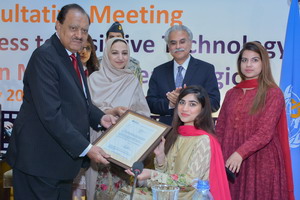Dr Hafeez was in the middle of completing her final year of medical studies at the Fauji Foundation Medical College in Rawalpindi, Pakistan, as the accident happened. She had dreamt of becoming a plastic surgeon. “After being consigned to a wheelchair, I thought that my hopes and dreams had become impossible to achieve. I felt helpless,” she recalls.
And yet, this harrowing experience ultimately turned out to be her source of strength. During the lengthy rehabilitation process following the accident, Dr Hafeez became a role model and a source of inspiration for other patients. “Disability shouldn’t stop anyone from achieving their goals,” she says.
Since the accident, Dr Hafeez has not only completed her medical studies and 1-year mandatory medical training, but has also completed initial exams to become a radiologist. Moreover, she has recently received an offer to work as a medical doctor at the Fauji Foundation Hospital in Rawalpindi, and has also gone on to become a strong advocate for improving access to assistive technology.
According to Dr Hafeez, there is an urgent need for greater awareness of the benefits of assistive technology and the scope and potential it has to assist those individuals living with disabilities. “There are grave issues of accessibility to assistive technology for people living with disabilities in Pakistan, especially in the rural areas. Many of the people who require assistive technology are not even aware of the scope and opportunities that it can bring to them and their daily lives,” Dr Hafeez explains.
Assistive technology is the umbrella term used for devices and technologies whose primary purpose is to maintain or improve an individual’s functioning and independence to facilitate participation and to enhance overall well-being. They can also help prevent impairments and secondary health conditions. Examples of assistive devices and technologies include wheelchairs, prostheses, hearings aids, visual aids, and specialized computer software and hardware that increase mobility, hearing, vision, or communication capacities. Currently, it is estimated that in low-income and middle-income countries, only 5–15% of people who require assistive devices and technologies have access to them.
In recognition of her resilience and determination, Dr Hafeez has been nominated as the first ever WHO Global Champion for Assistive Technology. The nomination was presented by His Excellency the President of Pakistan, Mr Mamnoon Hussain at the First Regional Meeting on Improving Access to Assistive Technology which took place from 8 to 10 May 2018 in Islamabad.
The prestigious nomination has further encouraged Dr Hafeez to advocate for improved access to assistive technology, not only in Pakistan but also at the global level. “I hope to continue to work closely with concerned organizations, legal authorities and engineers on enhancing the capacity of assistive technology. My ultimate goal is that it will help people with disabilities live healthy, productive, independent and dignified lives, just like I do,” she says.
Related link
Sana Hafeez, WHO Champion for assistive technology, told her story at the World Health Assembly









